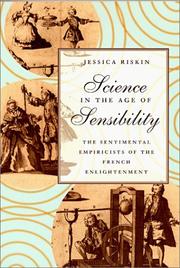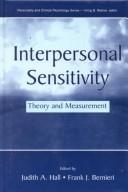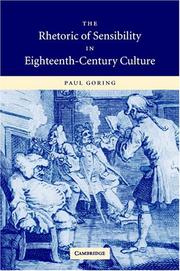| Listing 1 - 9 of 9 |
Sort by
|
Book
ISBN: 311032038X 9783110320381 3110320096 9783110320091 9783868381610 3868381619 9783110320091 Year: 2012 Publisher: Frankfurt Ontos Verlag
Abstract | Keywords | Export | Availability | Bookmark
 Loading...
Loading...Choose an application
- Reference Manager
- EndNote
- RefWorks (Direct export to RefWorks)
Philosophic attention shifted after Hegel from Kant's emphasis on sensibility to criticism and analyses of the fine arts. The arts themselves seemed as ample as nature; a disciplined science could devote as much energy to one as the other. But then the arts began to splinter because of new technologies: photography displaced figurative painting; hearing recorded music reduced the interest in learning to play it. The firm interiority that Hegel assumed was undermined by the speed, mechanization, and distractions of modern life. We inherit two problems: restore quality and conviction in the arts; cultivate the interiority-the sensibility-that is a condition for judgment in every domain. What is sensibility's role in experiences of every sort, but especially those provoked when art is made and enjoyed?
Book
ISBN: 9789089243782 Year: 2015 Publisher: Antwerpen Utrecht Houtekiet
Abstract | Keywords | Export | Availability | Bookmark
 Loading...
Loading...Choose an application
- Reference Manager
- EndNote
- RefWorks (Direct export to RefWorks)
Adultes surdoués --- Begaafden --- Boredom --- Ennui --- Genieën --- Geniuses --- Gifted adults --- Gifted persons --- Génies --- Hoogbegaafden --- Hooggevoelig (Persoonlijkheid) --- Hoogsensitief (Persoonlijkheid) --- Hypersensibilité (Personnalité) --- Personnes surdouées --- Prodiges (Personnes) --- Prodigies (Persons) --- Sensibility (Personality trait) --- Sensitiveness (Personality trait) --- Sensitivity (Personality trait) --- Surdoués --- Talented persons --- Verveling

ISBN: 0226720799 0226720780 Year: 2002 Publisher: Chicago (Ill.): University of Chicago press
Abstract | Keywords | Export | Availability | Bookmark
 Loading...
Loading...Choose an application
- Reference Manager
- EndNote
- RefWorks (Direct export to RefWorks)
Empiricism today implies the dispassionate scrutiny of facts. But Jessica Riskin finds that in the French Enlightenment, empiricism was intimately bound up with sensibility. In what she calls a ""sentimental empiricism,"" natural knowledge was taken to rest on a blend of experience and emotion.Riskin argues that sentimental empiricism brought together ideas and institutions, practices and politics. She shows, for instance, how the study of blindness, led by ideas about the mental and moral role of vision and by cataract surgeries, shaped the first school for the blind; how Benjami
Enlightenment --- Science --- Sensitivity (Personality trait) --- History --- 18th century. --- Enlightenment. --- Enlightenment -- France. --- France. --- History. --- Science. --- Science -- France -- History -- 18th century. --- Natural Science Disciplines --- Philosophy, Medical --- Empiricism --- Philosophy --- Disciplines and Occupations --- Humanities --- Physical Sciences & Mathematics --- Sciences - General --- Sensitivity (Personality trait). --- Sensibility (Personality trait) --- Sensitiveness (Personality trait) --- Susceptibility (Personality trait) --- Personality

ISBN: 0805831649 Year: 2001 Publisher: Mahwah, NJ ; London : Lawrence Erlbaum Associates [LEA],
Abstract | Keywords | Export | Availability | Bookmark
 Loading...
Loading...Choose an application
- Reference Manager
- EndNote
- RefWorks (Direct export to RefWorks)
Interpersonal relations --- -Sensitivity (Personality trait) --- -#SBIB:309H021 --- #SBIB:309H505 --- 316.47 --- Sensibility (Personality trait) --- Sensitiveness (Personality trait) --- Susceptibility (Personality trait) --- Personality --- Human relations --- Interpersonal relationships --- Personal relations --- Relations, Interpersonal --- Relationships, Interpersonal --- Social behavior --- Social psychology --- Object relations (Psychoanalysis) --- Research --- Intra- en interpersonele communicatie --- Code en boodschap: psychologische, psycho-analytische benadering --- Sociale relaties --(sociologie) --- 316.47 Sociale relaties --(sociologie) --- Sensitivity (Personality trait) --- #SBIB:309H021 --- Personnalité --- Empathie --- Perception d'autrui --- Relation interpersonnelle
Book
ISBN: 9783465036340 3465036344 Year: 2009 Publisher: Frankfurt am Main Vittorio Klostermann
Abstract | Keywords | Export | Availability | Bookmark
 Loading...
Loading...Choose an application
- Reference Manager
- EndNote
- RefWorks (Direct export to RefWorks)
Sensitivity (Personality trait) --- Sensibility (Personality trait) --- Sensitiveness (Personality trait) --- Susceptibility (Personality trait) --- Personality --- Kant, Immanuel --- Kant, I. --- Kānt, ʻAmmānūʼīl, --- Kant, Immanouel, --- Kant, Immanuil, --- Kʻantʻŭ, --- Kant, --- Kant, Emmanuel, --- Ḳanṭ, ʻImanuʼel, --- Kant, E., --- Kant, Emanuel, --- Cantơ, I., --- Kant, Emanuele, --- Kant, Im. --- קאנט --- קאנט, א. --- קאנט, עמנואל --- קאנט, עמנואל, --- קאנט, ע. --- קנט --- קנט, עמנואל --- קנט, עמנואל, --- كانت ، ايمانوئل --- كنت، إمانويل، --- カントイマニユエル, --- Kangde, --- 康德, --- Kanṭ, Īmānwīl, --- كانط، إيمانويل --- Kant, Manuel,
Book
ISBN: 9786612103476 1282103474 0253002788 9780253002785 9781282103474 0253352290 0253220157 9780253352293 9780253220158 6612103477 Year: 2008 Publisher: Bloomington Indiana University Press
Abstract | Keywords | Export | Availability | Bookmark
 Loading...
Loading...Choose an application
- Reference Manager
- EndNote
- RefWorks (Direct export to RefWorks)
Angelica Nuzzo offers a comprehensive reconstruction of Kant's theory of sensibility in his three Critiques. By introducing the notion of "transcendental embodiment," Nuzzo proposes a new understanding of Kant's views on science, nature, morality, and art. She shows that the issue of human embodiment is coherently addressed and key to comprehending vexing issues in Kant's work as a whole. In this penetrating book, Nuzzo enters new terrain and takes on questions Kant struggled with: How does a body that feels pleasure and pain, desire, anger, and fear understand and experience reason and strive toward knowledge? What grounds the body's experience of art and beauty? What kind of feeling is the feeling of being alive? As she comes to grips with answers, Nuzzo goes beyond Kant to revise our view of embodiment and the essential conditions that make human experience possible.
Sensitivity (Personality trait) --- Sensibility (Personality trait) --- Sensitiveness (Personality trait) --- Susceptibility (Personality trait) --- Personality --- Kant, Immanuel, --- Kant, Immanuel --- Kant, I. --- Kānt, ʻAmmānūʼīl, --- Kant, Immanouel, --- Kant, Immanuil, --- Kʻantʻŭ, --- Kant, --- Kant, Emmanuel, --- Ḳanṭ, ʻImanuʼel, --- Kant, E., --- Kant, Emanuel, --- Cantơ, I., --- Kant, Emanuele, --- Kant, Im. --- קאנט --- קאנט, א. --- קאנט, עמנואל --- קאנט, עמנואל, --- קאנט, ע. --- קנט --- קנט, עמנואל --- קנט, עמנואל, --- كانت ، ايمانوئل --- كنت، إمانويل، --- カントイマニユエル, --- Kangde, --- 康德, --- Kanṭ, Īmānwīl, --- كانط، إيمانويل --- Kant, Manuel,

ISBN: 9780511484261 9780521845090 9780521103206 9780511265723 0511265727 0511263449 9780511263446 0511264259 9780511264252 051126500X 9780511265006 0511484267 0521845092 1107164087 9781107164086 1280749768 9781280749766 0511317433 9780511317439 0521103207 Year: 2005 Publisher: Cambridge [England] ; New York : Cambridge University Press,
Abstract | Keywords | Export | Availability | Bookmark
 Loading...
Loading...Choose an application
- Reference Manager
- EndNote
- RefWorks (Direct export to RefWorks)
The Rhetoric of Sensibility in Eighteenth-Century Culture explores the burgeoning eighteenth-century fascination with the human body as an eloquent, expressive object. This wide-ranging study examines the role of the body within a number of cultural arenas - particularly oratory, the theatre and the novel - and charts the efforts of projectors and reformers who sought to exploit the textual potential of the body for the public assertion of modern politeness. Paul Goring shows how diverse writers and performers including David Garrick, James Fordyce, Samuel Richardson, Sarah Fielding and Laurence Sterne were involved in the construction of new ideals of physical eloquence - bourgeois, sentimental ideals which stood in contrast to more patrician, classical bodily modes. Through innovative readings of fiction and contemporary manuals on acting and public speaking, Goring reveals the ways in which the human body was treated as an instrument for the display of sensibility and polite values.
English literature --- Human body in literature. --- Sensitivity (Personality trait) in literature. --- Human body --- Sensitivity (Personality trait) --- Eighteenth century. --- Body, Human, in literature --- Human figure in literature --- 18th century --- Sensibility (Personality trait) --- Sensitiveness (Personality trait) --- Susceptibility (Personality trait) --- Personality --- Body, Human --- Human beings --- Body image --- Human anatomy --- Human physiology --- Mind and body --- History and criticism. --- Social aspects --- History --- Symbolic aspects --- Sensitivity (Personality trait). --- Human body in literature --- Arts and Humanities --- Literature
Book
ISBN: 3319027018 3319027026 Year: 2013 Publisher: Cham : Springer International Publishing : Imprint: Springer,
Abstract | Keywords | Export | Availability | Bookmark
 Loading...
Loading...Choose an application
- Reference Manager
- EndNote
- RefWorks (Direct export to RefWorks)
This volume reconstructs the body of sensibility and the discourse which constructed it. The discourse of sensibility was deployed very widely throughout the mid- to late-eighteenth century, particularly in France and Britain. To inquire into the body of sensibility is then necessarily to enter into an interdisciplinary space and so to invite the plurality of methodological approaches which this collection exemplifies. The chapters collected here draw together the histories of literature and aesthetics, metaphysics and epistemology, moral theory, medicine, and cultural history. Together, they contribute to four major themes: First, the collection reconstructs various modes by which the sympathetic subject was construed or scripted, including through the theatre, poetry, literature, and medical and philosophical treaties. It secondly draws out those techniques of affective pedagogy which were implied by the medicalisation of the knowing body, and thirdly highlights the manner in which the body of sensibility was constructed as simultaneously particular and universal. Finally, it illustrates the ‘centrifugal forces’ at play within the discourse, and the anxiety which often accompanied them. At the centre of eighteenth-century thought was a very particular object: the body of sensibility, the Enlightenment’s knowing body. The persona of the knowledge-seeker was constructed by drawing together mind and matter, thought and feeling. And so where the Enlightenment thinker is generally associated with reason, truth-telling, and social and political reform, the Enlightenment is also known for its valorisation of emotion. During the period, intellectual pursuits were envisioned as having a distinctly embodied and emotional aspect. The body of ‘sensibility’ encompassed these apparently disparate strands and was associated with terms including ‘sentimental’, ‘sentiment’, ‘sense’, ‘sensation’, and ‘sympathy’.
Mind and body. --- Philosophy, Modern. --- Philosophy. --- Sensitivity (Personality trait). --- History & Archaeology --- History - General --- Sensitivity (Personality trait) --- Sensibility (Personality trait) --- Sensitiveness (Personality trait) --- Susceptibility (Personality trait) --- Body and mind --- Body and soul (Philosophy) --- Human body --- Mind --- Mind-body connection --- Mind-body relations --- Mind-cure --- Somatopsychics --- Psychological aspects --- History. --- Medicine --- History of Science. --- History of Philosophy. --- History of Medicine. --- Personality --- Brain --- Dualism --- Philosophical anthropology --- Holistic medicine --- Mental healing --- Parousia (Philosophy) --- Phrenology --- Psychophysiology --- Self --- Philosophy (General). --- Medicine. --- Clinical sciences --- Medical profession --- Human biology --- Life sciences --- Medical sciences --- Pathology --- Physicians --- Annals --- Auxiliary sciences of history --- Health Workforce --- Medicine—History. --- Mental philosophy --- Humanities
Book
ISBN: 9783737003483 3737003483 9783847003489 3847003488 9783847103486 3847103482 Year: 2015 Publisher: Göttingen V & R Unipress
Abstract | Keywords | Export | Availability | Bookmark
 Loading...
Loading...Choose an application
- Reference Manager
- EndNote
- RefWorks (Direct export to RefWorks)
Senses and sensation in literature. --- Sensitivity (Personality trait) in literature. --- Sensitivity (Personality trait) --- Affect (Psychology) --- Emotions --- 159.942 <09> --- 159.942 <09> Emoties algemeen--Geschiedenis van ... --- Emoties algemeen--Geschiedenis van ... --- Feelings --- Human emotions --- Passions --- Psychology --- Affective neuroscience --- Apathy --- Pathognomy --- Sensibility (Personality trait) --- Sensitiveness (Personality trait) --- Susceptibility (Personality trait) --- Personality --- Social aspects. --- History. --- Philosophy of language --- History of civilization --- Affective and dynamic functions --- Sensitivity (Personality trait). --- Senses and sensation in literature --- Sensitivity (Personality trait) in literature --- Social aspects --- History --- Emoties algemeen--Geschiedenis van .. --- Emoties algemeen--Geschiedenis van . --- Emoties algemeen--Geschiedenis van
| Listing 1 - 9 of 9 |
Sort by
|

 Search
Search Feedback
Feedback About UniCat
About UniCat  Help
Help News
News